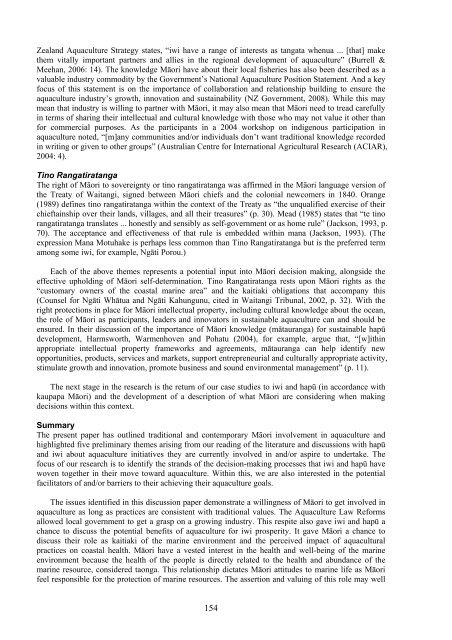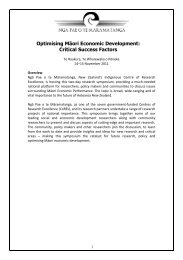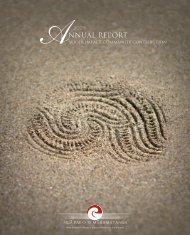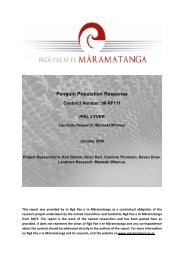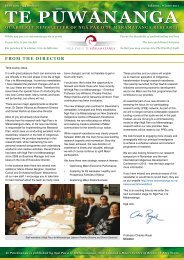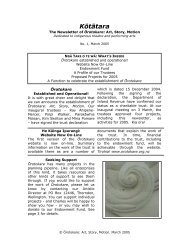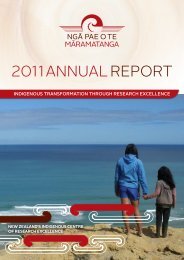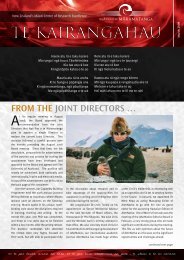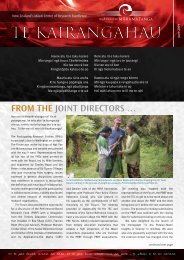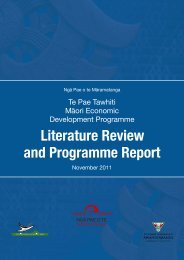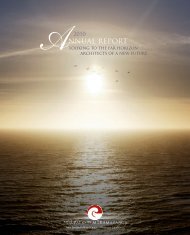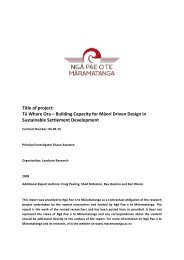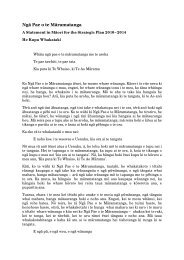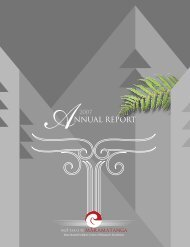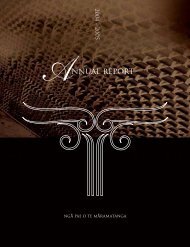traditional knowledge conference 2008 te tatau pounamu
traditional knowledge conference 2008 te tatau pounamu
traditional knowledge conference 2008 te tatau pounamu
Create successful ePaper yourself
Turn your PDF publications into a flip-book with our unique Google optimized e-Paper software.
Zealand Aquaculture Stra<strong>te</strong>gy sta<strong>te</strong>s, “iwi have a range of in<strong>te</strong>rests as tangata whenua ... [that] makethem vitally important partners and allies in the regional development of aquaculture” (Burrell &Meehan, 2006: 14). The <strong>knowledge</strong> Māori have about their local fisheries has also been described as avaluable industry commodity by the Government’s National Aquaculture Position Sta<strong>te</strong>ment. And a keyfocus of this sta<strong>te</strong>ment is on the importance of collaboration and relationship building to ensure theaquaculture industry’s growth, innovation and sustainability (NZ Government, <strong>2008</strong>). While this maymean that industry is willing to partner with Māori, it may also mean that Māori need to tread carefullyin <strong>te</strong>rms of sharing their in<strong>te</strong>llectual and cultural <strong>knowledge</strong> with those who may not value it other thanfor commercial purposes. As the participants in a 2004 workshop on indigenous participation inaquaculture no<strong>te</strong>d, “[m]any communities and/or individuals don’t want <strong>traditional</strong> <strong>knowledge</strong> recordedin writing or given to other groups” (Australian Centre for In<strong>te</strong>rnational Agricultural Research (ACIAR),2004: 4).Tino RangatiratangaThe right of Māori to sovereignty or tino rangatiratanga was affirmed in the Māori language version ofthe Treaty of Waitangi, signed between Māori chiefs and the colonial newcomers in 1840. Orange(1989) defines tino rangatiratanga within the con<strong>te</strong>xt of the Treaty as “the unqualified exercise of theirchieftainship over their lands, villages, and all their treasures” (p. 30). Mead (1985) sta<strong>te</strong>s that “<strong>te</strong> tinorangatiratanga transla<strong>te</strong>s ... honestly and sensibly as self-government or as home rule” (Jackson, 1993, p.70). The acceptance and effectiveness of that rule is embedded within mana (Jackson, 1993). (Theexpression Mana Motuhake is perhaps less common than Tino Rangatiratanga but is the preferred <strong>te</strong>rmamong some iwi, for example, Ngāti Porou.)Each of the above themes represents a po<strong>te</strong>ntial input into Māori decision making, alongside theeffective upholding of Māori self-de<strong>te</strong>rmination. Tino Rangatiratanga rests upon Māori rights as the“customary owners of the coastal marine area” and the kaitiaki obligations that accompany this(Counsel for Ngāti Whātua and Ngāti Kahungunu, ci<strong>te</strong>d in Waitangi Tribunal, 2002, p. 32). With theright pro<strong>te</strong>ctions in place for Māori in<strong>te</strong>llectual property, including cultural <strong>knowledge</strong> about the ocean,the role of Māori as participants, leaders and innovators in sustainable aquaculture can and should beensured. In their discussion of the importance of Māori <strong>knowledge</strong> (mātauranga) for sustainable hapūdevelopment, Harmsworth, Warmenhoven and Pohatu (2004), for example, argue that, “[w]ithinappropria<strong>te</strong> in<strong>te</strong>llectual property frameworks and agreements, mātauranga can help identify newopportunities, products, services and markets, support entrepreneurial and culturally appropria<strong>te</strong> activity,stimula<strong>te</strong> growth and innovation, promo<strong>te</strong> business and sound environmental management” (p. 11).The next stage in the research is the return of our case studies to iwi and hapū (in accordance withkaupapa Māori) and the development of a description of what Māori are considering when makingdecisions within this con<strong>te</strong>xt.SummaryThe present paper has outlined <strong>traditional</strong> and con<strong>te</strong>mporary Māori involvement in aquaculture andhighligh<strong>te</strong>d five preliminary themes arising from our reading of the li<strong>te</strong>rature and discussions with hapūand iwi about aquaculture initiatives they are currently involved in and/or aspire to undertake. Thefocus of our research is to identify the strands of the decision-making processes that iwi and hapū havewoven together in their move toward aquaculture. Within this, we are also in<strong>te</strong>res<strong>te</strong>d in the po<strong>te</strong>ntialfacilitators of and/or barriers to their achieving their aquaculture goals.The issues identified in this discussion paper demonstra<strong>te</strong> a willingness of Māori to get involved inaquaculture as long as practices are consis<strong>te</strong>nt with <strong>traditional</strong> values. The Aquaculture Law Reformsallowed local government to get a grasp on a growing industry. This respi<strong>te</strong> also gave iwi and hapū achance to discuss the po<strong>te</strong>ntial benefits of aquaculture for iwi prosperity. It gave Māori a chance todiscuss their role as kaitiaki of the marine environment and the perceived impact of aquaculturalpractices on coastal health. Māori have a ves<strong>te</strong>d in<strong>te</strong>rest in the health and well-being of the marineenvironment because the health of the people is directly rela<strong>te</strong>d to the health and abundance of themarine resource, considered taonga. This relationship dicta<strong>te</strong>s Māori attitudes to marine life as Māorifeel responsible for the pro<strong>te</strong>ction of marine resources. The assertion and valuing of this role may well154


